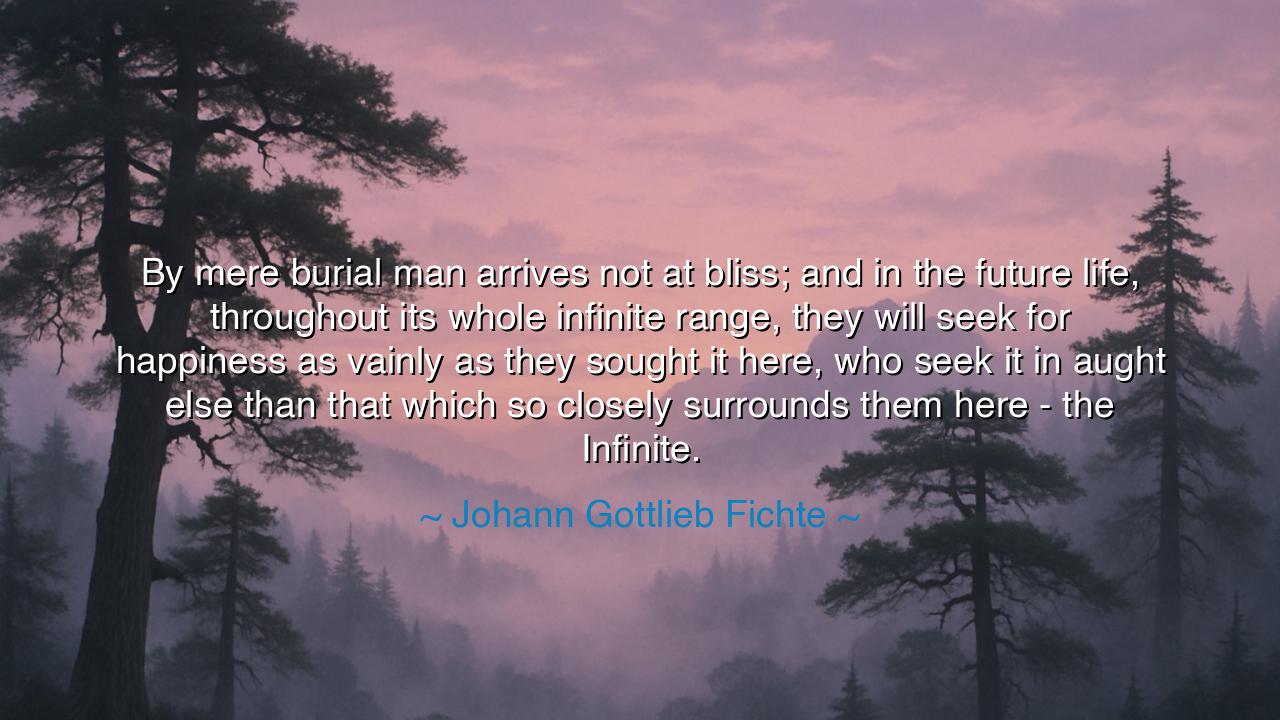
By mere burial man arrives not at bliss; and in the future life
By mere burial man arrives not at bliss; and in the future life, throughout its whole infinite range, they will seek for happiness as vainly as they sought it here, who seek it in aught else than that which so closely surrounds them here - the Infinite.






When Johann Gottlieb Fichte wrote, “By mere burial man arrives not at bliss; and in the future life, throughout its whole infinite range, they will seek for happiness as vainly as they sought it here, who seek it in aught else than that which so closely surrounds them here—the Infinite,” he spoke not only as a philosopher but as a seer of the soul. His words are a meditation on eternity, human striving, and the eternal search for happiness. He reminds us that neither death nor the afterlife changes the truth of the human condition: that true bliss is not found in things that pass, but in that which is eternal, in the Infinite that surrounds us even now. To those who chase happiness in possessions, honors, or fleeting pleasures, Fichte warns that their pursuit will be as fruitless beyond the grave as it was in life. Only by recognizing and dwelling within the divine—the Infinite—can one find peace that transcends both time and death.
Fichte, one of the great German idealists of the late 18th century, believed that reality itself is a reflection of the moral and spiritual consciousness of man. To him, life was not a random passage toward death, but a journey of the spirit toward the Absolute—toward union with what he called the Infinite, or the eternal moral order of the universe. He saw that many live as though the soul were a beggar, seeking joy in the glittering trinkets of the world—wealth, fame, and power—only to find that these are but shadows of happiness, not its substance. His words strike like thunder against the illusion that death alone will bring peace or justice. He declares that the soul that does not seek the Infinite in life will not suddenly find it in death, for the afterlife is not an escape from truth—it is a continuation of it.
This teaching echoes the wisdom of the ancients. The Stoics of Greece and Rome, like Marcus Aurelius, taught that the only path to serenity lies in harmony with the divine order of nature. The mystics of the East, too, proclaimed that liberation—nirvana, moksha, or union with the divine—is not found by fleeing the world, but by awakening within it. Fichte’s “Infinite” is that same sacred reality which the wise of all ages have named in many tongues—the unchanging essence that sustains all things. His words remind us that the kingdom of truth is not in some distant heaven, but “so closely surrounding us here”—in the quiet pulse of existence, in the boundless unity of being, in the divine presence that dwells in every heart.
To understand his message, consider the story of Leo Tolstoy, the great Russian writer who, after achieving fame and fortune, fell into despair. He confessed that life, despite all its beauty, seemed meaningless, and he contemplated ending it. But when he turned his gaze inward, he saw that he had sought happiness in worldly glory, not in the Infinite—the spiritual essence that gives life meaning. In faith, in compassion, and in service, he found the peace that power and wealth had denied him. Like Tolstoy, Fichte calls us to awaken to the truth that the Infinite is not far away; it is the very ground of being, the quiet voice that whispers beneath all change: “Be still, and know that I am.”
Fichte’s words also carry a warning for the restless spirit of our modern age. We live surrounded by noise, ever reaching for new experiences, new pleasures, new distractions. Yet even if the body were to perish and the soul to awaken in some new world, such a soul would carry its hunger with it. For wherever the soul goes, there it is—still seeking, still unsatisfied, until it learns to anchor itself not in the temporary but in the eternal. Thus, he teaches that death is no deliverance for the unawakened heart. The same vanity that governs our earthly pursuits will haunt the next life unless we learn to dwell now in the Infinite—the divine presence, the eternal truth that gives all things meaning.
To seek the Infinite, Fichte says, is not to abandon the world, but to see the Infinite within it. Every act of goodness, every moment of contemplation, every selfless deed brings us closer to that eternal reality. The Infinite is not an abstract idea—it is the sacred pulse of existence itself, the love that binds creation together. The wise do not wait for death to find it; they live it daily, in reverence, justice, and love. The heart that learns to find the Infinite in the finite world already lives in eternity, for it has ceased to be bound by time and circumstance.
So let this truth be engraved upon your soul: no one is saved by death, but by awakening. Seek not happiness in wealth, praise, or power, for they perish with the breath that pursues them. Seek it instead in the Infinite—the divine truth that surrounds you even now. Cultivate stillness, humility, and love; in them, you will find the door to bliss. Remember Fichte’s wisdom: that happiness cannot be found in what is fleeting, but only in what is eternal. For when the soul learns to rest in the Infinite, it needs no heaven to be fulfilled; it has already entered eternity.






AAdministratorAdministrator
Welcome, honored guests. Please leave a comment, we will respond soon